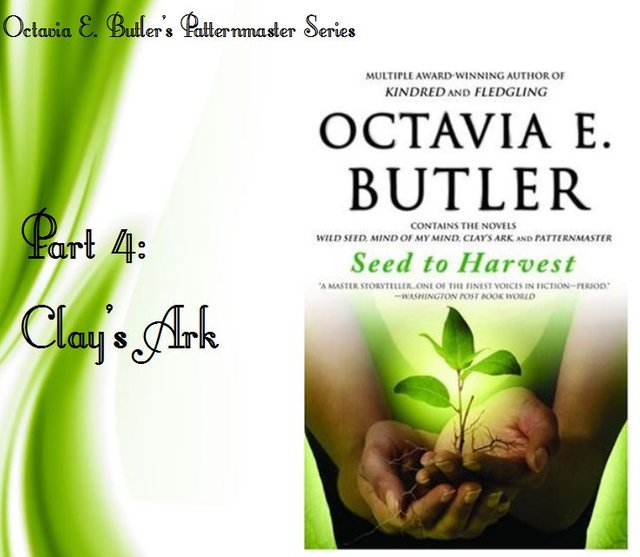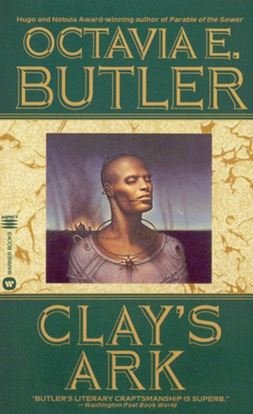Clay’s Ark Review – Octavia E. Butler’s Seed to Harvest

The Patternmaster series is coming to an end with the last published book Clay’s Ark, a very different novel that somehow feels detached from the others.
If you are new to this series, feel free to check out Part 1, 2 and 3, but they won’t help you here because Clay’s Ark is not about the pattern or any characters from these books.
When I started to write this reviews I had just finished reading Wild Seed and figured that Clay’s Ark would either include the minor character Clay from Mind of my Mind or the old patternmaster attacked in the beginning of the first book. I didn’t rely on it but I thought that would make sense. I didn’t even think about the more obvious connection, mostly because at that point I had almost forgotten about the Clayarks, monster-like creatures introduced in Patternmaster.
You can’t really blame me for that. It’s been two other, much more interesting books since than and even in Patternmaster, the Clayarks didn’t seem that essential to the story. They were a minor threat, a nice piece of world building and kind of played a part in Teray’s character development, but they were mostly forgettable compared to more important plot parts.
Now that I’ve introduced you to them many books later than I should have: How is Clay’s Ark?

Like already mentioned, Clay’s Ark is not about the pattern in any way. It tells the backstory about how the Clayarks came to be and what caused their mutations. The novel starts with a family consisting of a father and his two daughters being kidnapped by a group of people that are infected with some kind of disease. From then on, they learn about the origin and the effects of that mysterious infection and have to fear being infected themselves.
This book is not told in chronological order at all, which is kind of reminiscent of the whole series. Not only does the narrative constantly switch between present and past from chapter to chapter, the parts told in the present are In mixed order, too. Actually, this sounds more confusing than it is and once you are aware of that it becomes easy to adapt. It does happen without a warning nonetheless, so it catches the reader off guard.
The relationship between the captors and their captives is quit interesting. While the captors were obviously most of the time quit friendly and convinced they were doing the right thing, I could never really tell what the family was thinking. On the one hand, there was the natural sense of disgust and wanting to break free but there was also a very inconsistent sympathy or even Stockholm Syndrome. This perceived inconsistency may be caused by the time shifts or even be intended by the author, but I kept constantly asking why they kept contradicting themselves.
The backstory for the disease and mutations was actually fascinating and the story around the kidnapped family was done-well for the most part, too. I really enjoyed the book until the ending came near and the whole, pretty quiet and balanced story became a rushed mess. It of course depends on your taste and opinion, but for me just a lot of things happened that weren’t necessary and felt forced.
The themes of slavery and family return again and as always are expressed in a different way than before. The enslavement is done by the disease controlling the infected this time and the family theme applies to the father and the daughters as well as their kidnappers and their community. Health is something addressed in various ways as well, with e.g. one of the daughters being terminally ill.
I am quit unsure how much I liked this book. The parts that worked intrigued me a lot but the parts that didn’t quit work for me really drew me out of the story. It is the weakest of the books for a lot of readers, but I still prefer this to Patternmaster in a way. A book with parts I loved and parts I hated is just more interesting for me than a book that is consistently mediocre most of the time. While it seems easier to complain than to praise, Clay’s Ark is a lot of fun to read and I can imagine me rereading it despite it flaws.
That ends the Patternmaster series. Tomorrow I will do a wrap-up of the themes, strengths and weaknesses, as well as some finals words from me about these books.